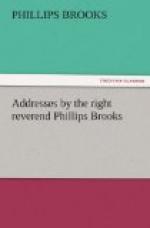What is the Christian? Everywhere the man who, so far as he comprehends Jesus Christ, so far as he can get any knowledge of Him, is His servant, the man who makes Christ a teacher of his intelligence and the guide of his soul, the man who obeys Christ as far as he has been able to understand Him. What, you say, the man who imperfectly understands Christ, who don’t know anything about His divinity, who denies the great doctrines of the Church in regard to Him, is he a Christian? Certainly he is, my friends. There is no other test than this, the following of Jesus Christ. So far as any soul deeply consecrated to Him, and wanting the influence that it feels that He has to give, follows Christ, enters into His obedience and His company, and receives His blessings, just so far He is able to bestow it. I cannot sympathize with any feeling that desires to make the name of Christian a narrower name. I would spread it just as wide as it can be possibly made to spread. I would know any man as a Christian, rejoice to know any man as a Christian, whom Jesus would recognize as a Christian, and Jesus Christ, I am sure, in those old days recognized His followers even if they came after Him with the blindest sight, with the most imperfect recognition and acknowledgment of what He was and of what He could do.
And then, again, is it not very strange, certainly, that there should be, in these later days, in all these centuries that have passed between the day of Jesus Christ and us, that there should have come a vast accumulation of speculation and conjecture, of theorizing and thought with regard to Christ and what He was, and that a great deal of it should have been very strange and should seem to us to-day to have been very silly, a great part of it should have seemed to be but a work of intelligences that were half dulled and blinded, full of prejudice, and shrinking from the error and the danger in which they stood? What does it mean—all these complicated theologies that we say are keeping us away from the simple following of the grandest figure that has ever presented Himself before human kind? I know not




